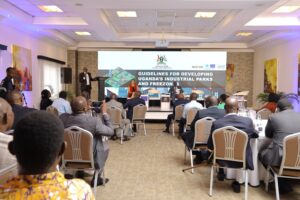Kampala, Uganda, 23 May 2024 – A significant milestone was achieved in the realm of industrial development with the official launch of the Guidelines for Developing Uganda’s Industrial Parks and Free Zones 2024 by the Ministry of Trade, Industry, and Cooperatives with support from the Global Green Growth Institute under the European Union-funded project. These guidelines contribute to the operationalization of the Ministry’s Industrial Policy, 2020, the third and fourth National Development Plan, and Vision 2040, as far as the establishment and management of Industrial Parks and Free Zones is concerned.
Uganda’s industrial sector, which includes agricultural processing, manufacturing, construction, mining, and utilities, is a crucial pillar of the nation’s economy. Contributing significantly to the country’s Gross Domestic Product (GDP), the manufacturing output alone stands at 16.5%. Despite this substantial contribution, the sector faces challenges such as export hurdles and low-capacity utilization. The 2020 Industry Policy aims to address these issues, with a specific target to increase manufacturing’s share of GDP from 8.3% in 2018 to 16% by 2029/30.
The newly launched guidelines are a strategic move in Uganda’s broader economic agenda, designed to drive economic growth, attract foreign direct investment, and bolster industrial development. By setting a clear and comprehensive framework, these guidelines are expected to streamline the establishment and management of industrial parks and free zones, positioning Uganda as a prime destination for industrial investment while ensuring environmental sustainability.
During the launch event, the government and other stakeholders underscored their dedication to fostering the growth of the industrial sector. The guidelines are seen as a transformative step towards achieving the country’s industrialization goals. “…these guidelines are essential for establishing sustainable industrial parks, reducing the cost of industrial setup for investors, promoting industrial symbiosis, and mitigating social and environmental impacts,” Hon. Francis Mwebesa, Minister of Trade, Industry and Cooperatives remarked. “The guidelines signify Uganda’s commitment to advancing low-carbon economic growth, they address environmental sustainability issues across industry, trade, and development, aligned with our Free Zones Operations.” Dr. Hez Kimoomi Alinda, Executive Director, Uganda Free Zones Authority emphasized. Ms. Dagmar Zwebe, Country Representative GGGI reinforced the critical nature of green industrialization, stating, “Embracing green industrialization isn’t just an option, it’s an imperative. It’s the pathway that can contribute to a healthier planet, cleaner air, and green jobs creation. Therefore, its implementation is vital.”
The guidelines aim to provide a structured approach to the development and management of industrial parks and free zones in Uganda, ensuring they are sustainable and economically viable. Key objectives include:
- To support decision-making in the establishment, management, operation, financing, marketing, and promotion of industrial parks.
- To define the roles of the different actors in the establishment, management, operation, financing, marketing, and promotion of industrial parks.
- To promote social and environmental sustainability in the driving of the industrialization agenda through Industrial Parks and Free Zones.
As Uganda advances towards building a strong, inclusive, and sustainable economy, GGGI hopes to continue working with the Government of Uganda to further segment this initiative. This collaborative effort is poised to solidify Uganda’s position on the global industrial stage, fostering a conducive environment for sustainable economic growth, job creation, and technology transfer, all while embracing the imperative of green industrialization for a healthier planet and prosperous future.
Government and stakeholders present for the launch include the Ministry of Trade, Industry and Cooperatives (MTIC), Ministry of Finance, Planning and Economic Development (MoFPED), National Planning Authority (NPA), Uganda National Bureau of Standards (UNBS), Ministry of Local Government (MoLG), Uganda Small Scale Industries Association (USSIA), Uganda Free Zones Authority (UFZA), United Nations Development Programme (UNDP), Operation Wealth Creation (OWC), Uganda Cooperatives Alliance (UCA), National Building Review Board (NBRB), Trade Mark Africa, Uganda Manufacturers Association (UMA), Federation of Small and Medium-Sized Enterprise (FSME).
